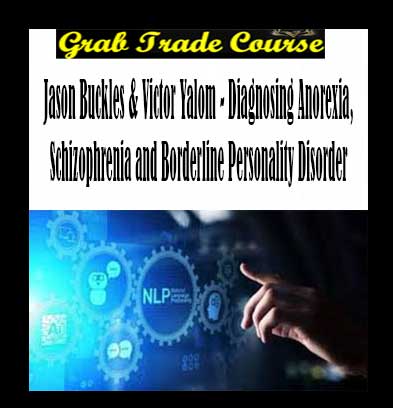Jason Buckles & Victor Yalom – Diagnosing Anorexia, Schizophrenia and Borderline Personality Disorder
Description
Jason Buckles & Victor Yalom – Diagnosing Anorexia Schizophrenia and Borderline Personality Disorder review, Jason Buckles & Victor Yalom – Diagnosing Anorexia Schizophrenia and Borderline Personality Disorder download, Jason Buckles & Victor Yalom – Diagnosing Anorexia Schizophrenia and Borderline Personality Disorder free
Jason Buckles & Victor Yalom – Diagnosing Anorexia, Schizophrenia and Borderline Personality Disorder
Diagnosing Anorexia, Schizophrenia and Borderline Personality Disorder
by Jason Buckles & Victor Yalom
Schizophrenia, Anorexia, and Borderline Personality Disorder—difficult to treat, challenging for most clinicians and absolutely essential to diagnose accurately. In volume 4 of this series, learn the specialized skills required to gather information and establish rapport with clients struggling with these disorders.
Certain diagnoses require specialized skill to both diagnose and treat, and anorexia, schizophrenia and borderline personality disorder all fit that description. With both anorexia and schizophrenia, medical information and contact with the treating physician is often necessary, while with borderline personality, symptoms may initially be masked and not emerge until months into therapy—making it all the more important to be skilled at obtaining the necessary clinical information in the initial interview. In this final installment of the series, watch skilled interviewers working with a young man who has schizophrenia, an aspiring ballerina struggling with anorexia, and a woman with all the features we associate with borderline personality disorder. You’ll see the therapists struggle with these clients—as lack of insight and psychotic thinking can often be present with these disorders—and still find a way to gather information for a working diagnosis.
Jason Buckles and Victor Yalom offer insightful commentary before, during and after each vignette so that you get a feel for how to work with clients who may be resistant to opening up, unable to self-reflect or even hostile to the therapist. As most clinicians encounter challenging and sometimes mystifying clients and symptoms, the tools covered in this volume are essential!
In Depth
Volume 4 in the DSM-5 Diagnostic Interviewing Series provides viewers with clinical interviews of clients demonstrating symptoms associated with schizophrenia, anorexia, and borderline personality disorder. Because these disorders are such serious, long-term disorders, Buckles notes the necessity of follow-up interviews, as well as input from medical personnel and family members or close associates, before confidently making these diagnoses. These interviews help viewers understand how to both attend to the client’s pace, and direct the interview to obtain the critical information necessary to formulate a tentative diagnosis. The interviewer is able to reveal how you can stay on task while at the same time engaging the client with empathy, self-disclosure, and humor.
As in other videos in this series, Yalom and Buckles continue to add richness and texture to the interview itself with their lively commentary, noting how diagnoses have changed over time, and the difficulties inherent in quantifying subjective terms or concepts such as “functionality.” In voice-over commentary, Buckles points out how to record client accounts of their symptoms and experiences in ways that are nonjudgmental, factual, and objective. This can be very helpful to professionals learning how to record key aspects of clinical or diagnostic interviews.
Viewers meet two individuals and one mother-son pair who all demonstrate the life struggles and critical details necessary to understand what these clusters of symptoms look like when they reach a diagnosable level. Of course, the interviews are not perfect, but we learn from that as well. With humor and insight, Buckles and Yalom note the omissions and discuss what the interviewer might have done differently, or what the interviewer might do in the next session.
Also modeled in these vignettes are skills related to destigmatizing the symptoms and the diagnosis. Further, the interviewer demonstrates how to introduce the notion of continuing in therapy to address the disorder and improve the client’s overall mental health.
By watching this video, you will be able to:
- Recognize the symptoms associated with schizophrenia, anorexia, and borderline personality disorder.
- Gain skills in conducting a diagnostic interview with clients suffering from these disorders who also lack insight or the ability to self-report that sometimes accompanies some of these particular disorders.
- Expand your differential diagnostic skillset, as well as your understanding of both the overlapping, and the distinguishing features, of these disorders.
Specs
Length of video: 2:25:20
English subtitles available
Bios
Jason Buckles, PhD, earned his Bachelor’s in Psychology at New York University in 1992. While there he worked on psychiatric diagnostic projects at Bellevue Hospital and the New York Psychiatric Institute. He earned his Master’s in Counseling at The University of New Mexico in 2001 and PhD at The University of New Mexico in 2016. Buckles has a private mental health counseling practice and behavior consultation agency specializing in supports for people with intellectual disability and concurrent mental health diagnoses. From 2012 through 2016 he was the statewide clinical director of the New Mexico Department of Health—Bureau of Behavioral Support. Since late 2016 he has been the executive director of A Better Way of Living, an agency that provides life-wide supports for people with intellectual disability and concurrent behavioral and/or mental health conditions. He has taught psychiatric assessment and diagnosis at New Mexico Highlands University since 2002 and in the Special Education department at The University of New Mexico since 2015.
Learning Objectives:
List the symptoms associated with Schizophrenia, Anorexia, and Borderline Personality Disorders
Describe skills in conducting a diagnostic interview with clients suffering from these disorders
Revise your differential diagnostic skill set
Our Policies
A. Product Quality
We will provide GOOD quality of courses fast. If any issue, email: [email protected].
We sure that your problem will be support as soon as possible.
B. Digital Shipping Proceess
After your payment, we will review your payment, Then, we will send you PCLOUD LINK OF COURSES through email in 3 – 8 hours. If any issue, we will inform you as soon as possible.









Reviews
There are no reviews yet.